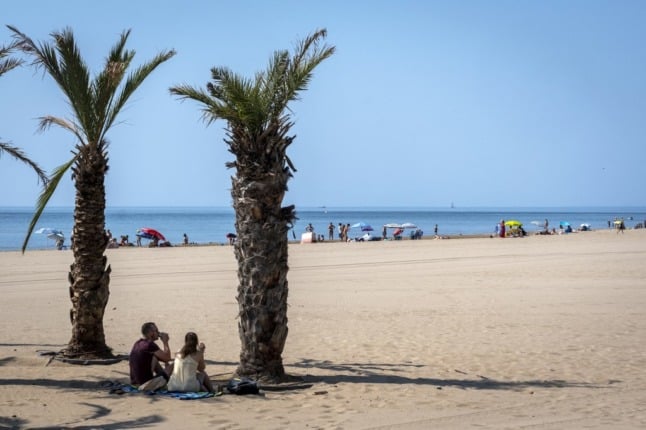In 2019 France was the world’s top tourism destination (and several years before that, come to mention it) with 90 million visitors, and with Covid restrictions lifting and vaccination rates picking up, the country is looking to retain its ranking.
Here’s how it plans to do it:
Spending money
On Tuesday, the tourism minister launched a multi-million euro campaign aimed at attracting tourists back.
“France is kind of the world in miniature,” Jean-Baptiste Lemoyne, the junior minister at the foreign ministry in charge of tourism, told a virtual press conference.
“It’s 50 shades of holidays. Everyone can choose their own,” he added.

The “What Really Matters” campaign promotes the country’s lifestyle, including its food and culture, in 10 European markets – Austria, Belgium, Britain, Denmark, Germany, Italy, Netherlands, Spain, Sweden and Switzerland.
With plenty of rural spaces, outdoor activities and sparsely populated areas, France will also be hoping to appeal to people who want to avoid the crowds this summer.
READ ALSO 10 of the best Covid-compliant activities in France this summer
Dissing the neighbours
Of course France is not the only country to have thought of this, many European countries are launching their own campaigns.
Greece is extolling the virtues of sun-kissed “Covid-free” islands where everyone is vaccinated against the virus and Croatia has drawn up a map of “Covid-free zones” on its islands.
Italy, which is counting on a tourist revival to emerge from a deep recession, said last week it was ready to welcome back travellers.
“It’s time for you to book your holidays in Italy!” Prime Minister Mario Draghi declared.
But France seems not above taking a swipe at its rivals.
Comparing the campaign to that of Switzerland, which is fronted by tennis champion Roger Federer, the head of France’s tourism development agency, Caroline Leboucher, said France sparked “more emotion” than the “cold sanitary perfection” of the Swiss.
I must admit – Robert De Niro is right: Switzerland is just too perfect, too nice. 😉🇨🇭🎥 @MySwitzerland_e #IneedSwitzerland #InLoveWithSwitzerland #paidpartnership https://t.co/35N7PI2H12
— Roger Federer (@rogerfederer) May 4, 2021
Meanwhile Didier Arino, head of the Protourisme consulting firm, said: “It’s not difficult to come to France for our European neighbours whereas for the Greek islands you have to take a plane or a boat.”
READ ALSO Discover France’s 14 most beautiful and well-loved villages
Reopening
Emerging from its third wave of Covid cases and with increasing vaccination rates, the French government has also laid out a detailed programme of reopening, which will see bars, cafés and restaurants allowed to reopen their outdoor spaces from May 19th and indoors from June.
Tourist attractions, museums and cultural spaces will also be reopening from May 19th, albeit with restrictions in place.
IN DETAIL France’s calendar for reopening from lockdown
Staycationing
Tourism revenue in France amounted to €57 billion in 2019, the year before the pandemic, representing around 7.5 percent of GDP, but a significant proportion of France’s tourism revenue has always come from domestic tourism.
French people frequently ‘staycation’ even in normal times, often decamping from cities to the beach or the mountains for the month of August to enjoy a more relaxed pace of life and time with the family.
Lemoyne has this year urged the French to “go blue, white and red” – or holiday in France – to show their support for the embattled tourist businesses.
“Our tourism operators have suffered a lot,” he pleaded.
Waiving restrictions?
France might be keen to welcome back foreign tourists but that has not, so far, lead to any relaxation of the entry requirements to the country.
At present people can travel to France for any reason – including tourism – from the EU or Schengen zone, plus seven non-EU countries including the UK, Australia and New Zealand.
All arrivals, however, have to present a negative Covid test on arrival and there are no immediate plans to change this.
READ ALSO Everything you need to know about travel between France and the UK
Travel from outside the EU – including the USA – is set to restart from June 9th.
READ ALSO When can Americans travel to France again?
By contrast Greece, Iceland and Croatia have already waived restrictions for fully vaccinated travellers from EU countries, as well as the US, Britain and Israel, in order to ensure they do not lose bookings.
Vaccine passport
With the holiday season set to start next month, pressure is growing on the European Commission to finalise a highly-anticipated EU-wide digital health pass.
The pass, which will allow people who are fully vaccinated, have already had Covid-19 or who have tested negative for the virus to travel within the Bloc, is seen as a key tool to save the summer holiday period.
While it will initially be used only for travel within the Bloc, the EU is working on the pass being mutually recognised with certificates from non-EU countries, particularly the United States.
Announcing a four-stage timetable for reopening the country after a third lockdown last month, President Emmanuel Macron gave June 9th as the prospective date for the return of non-EU tourists.
France has already begun work on its own ‘health passport’ which is operational via the TousAntiCovid tracking app, and people now getting vaccinated in France are receiving certificates with QR codes that can be scanned into the app to create a ‘passport’.
READ ALSO How can you access France’s ‘health passport’?
However more work needs to be done to ensure that the French pass is accepted and compatible with technology from other countries.
The ‘health passport’ is set to come into operation from June 9th.



 Please whitelist us to continue reading.
Please whitelist us to continue reading.
Member comments